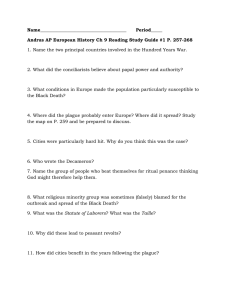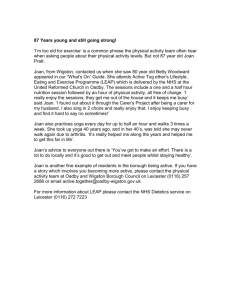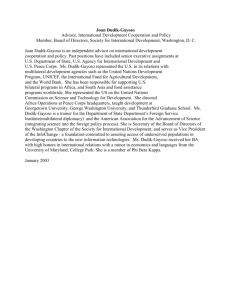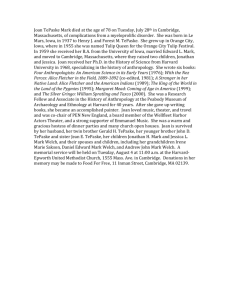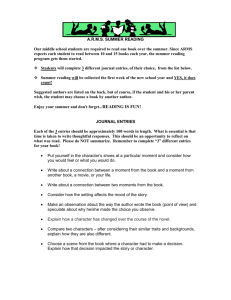Part One
advertisement
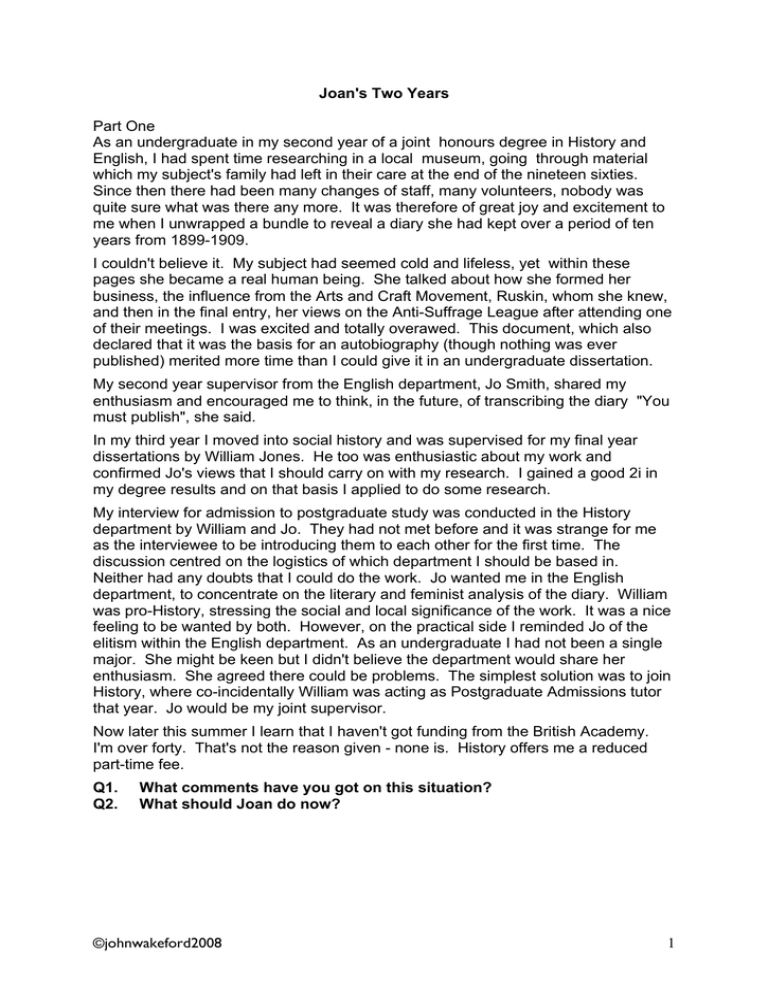
Joan's Two Years Part One As an undergraduate in my second year of a joint honours degree in History and English, I had spent time researching in a local museum, going through material which my subject's family had left in their care at the end of the nineteen sixties. Since then there had been many changes of staff, many volunteers, nobody was quite sure what was there any more. It was therefore of great joy and excitement to me when I unwrapped a bundle to reveal a diary she had kept over a period of ten years from 1899-1909. I couldn't believe it. My subject had seemed cold and lifeless, yet within these pages she became a real human being. She talked about how she formed her business, the influence from the Arts and Craft Movement, Ruskin, whom she knew, and then in the final entry, her views on the Anti-Suffrage League after attending one of their meetings. I was excited and totally overawed. This document, which also declared that it was the basis for an autobiography (though nothing was ever published) merited more time than I could give it in an undergraduate dissertation. My second year supervisor from the English department, Jo Smith, shared my enthusiasm and encouraged me to think, in the future, of transcribing the diary "You must publish", she said. In my third year I moved into social history and was supervised for my final year dissertations by William Jones. He too was enthusiastic about my work and confirmed Jo's views that I should carry on with my research. I gained a good 2i in my degree results and on that basis I applied to do some research. My interview for admission to postgraduate study was conducted in the History department by William and Jo. They had not met before and it was strange for me as the interviewee to be introducing them to each other for the first time. The discussion centred on the logistics of which department I should be based in. Neither had any doubts that I could do the work. Jo wanted me in the English department, to concentrate on the literary and feminist analysis of the diary. William was pro-History, stressing the social and local significance of the work. It was a nice feeling to be wanted by both. However, on the practical side I reminded Jo of the elitism within the English department. As an undergraduate I had not been a single major. She might be keen but I didn't believe the department would share her enthusiasm. She agreed there could be problems. The simplest solution was to join History, where co-incidentally William was acting as Postgraduate Admissions tutor that year. Jo would be my joint supervisor. Now later this summer I learn that I haven't got funding from the British Academy. I'm over forty. That's not the reason given - none is. History offers me a reduced part-time fee. Q1. Q2. What comments have you got on this situation? What should Joan do now? ©johnwakeford2008 1 Part Two In fact, I feel committed to this path and therefore that I must carry on. So I accept the part time place, but things begin to change almost as soon as I started. Jo who is already overburdened with work cannot act as my supervisor because there is no money to pay the English department (due to my financial position). Anyway, she is taking study leave for a year in the States. She remains very supportive, however, and towards the end of the summer I go to see her before she leaves for the USA. I am in a panic. My situation seems to be the reverse of most postgraduates. I have my case study/research project clearly defined, but my main problem lies in deciding how to do it. In my summer reading I'd come across feminist methodologies in writing women's lives. I was exhilarated, but this self-conscious writing - putting your self in the text - frightens me. Jo is reassuring. While we talked she printed out the final draft of her next book. She suggests that I make contact with the Women's Study Centre and sit in on the MA course, "Aspects of Feminist Methodology". William is non-committal, It's not his field. Q1. Q2 What comments have you got at this stage? What should Joan do now? ©johnwakeford2008 2 Part Three Actually, I dig my heels in. The reception I receive from Women's Studies staff is warm and welcoming but it becomes clear that I need a Women's historian. There is only one candidate in the History department - Ros. She agrees to take me on but she is sceptical about theories and not "au fait" with feminist methodologies. At the end of my first year Ros leaves to take up an appointment in another university. She is replaced not by a woman historian but by a man whose specialism only covers the European, social aspect of her teaching. Now there is no feminist/women's historian in the History department - except me!. Q1. Q2. Any comments at this stage? What should Joan do now? ©johnwakeford2008 3 Part Four Second postgraduate year. Turned down, again, for funding. But that old maxim "I've started so I'll finish" is ringing in my ears. Beginning to think about how quickly I can finish. Only part-time, but William says I've done as much work as any full-time postgraduate. Is this the right attitude? I borrow money to pay my fees. Earlier in the year William and another history professor had recommended me for teaching in department of Continuing Education. I put a course together which is accepted and advertised. Throughout the summer I attend teaching workshops etc., but enrolment numbers look doubtful raising questions about whether the course will run. Then, a day before the course is due to start, I am told it can run with reduced numbers, if I am willing. I am willing: I need the money. I had already turned down any teaching in the History department because of the possibility of this workload. Two days later my younger daughter is diagnosed as having glandular fever. Q1. Q2. What are your comments at this stage? What would you suggest Joan does now? ©johnwakeford2008 4 Part Five I have three children and I'm a single parent. This opportunity has come late for me, but not too late, I hope. I am still exhilarated at having this opportunity but it's getting tougher to justify financially. I should be getting a job, but what jobs are there? I still want to be able to meet my son after school at 3 p.m. I can't afford child-care anyway. If I got funding for my research that would be perfect. I've talked to William. Sometimes we meet socially. He's only a year older than me. He knows my situation but I don't want to burden him. I want him to feel positive about my work, and that means me as well. If he feels I'm overburdened, he might suggest I give up (is this a silent contract?). It's my responsibility. I'm a grown up but I wish the department was more aware of what postgraduates have to deal with in order to do their research. There isn't even the promise of a job at the end of it these days. We're real people. It's very different now from when the majority of lecturers did their doctorates twenty years ago. I now belong to the Women's Studies Centre and attend the Women's Studies Forum, but I have to do this unofficially as it is a recognised and funded part of ESRC requirements for postgraduates but again no money follows me. (Does parttime sometimes equate to second-rate because one doesn't have the financial backing of an organisation or institution?) It is, however, a supportive crossdisciplinary group where your problems don't seem so bad when you realise others are in the same position. There isn't a group like this in the History department which helps me justify my membership elsewhere. Friends, whatever age, are very important to share in the frustration, isolation and in sustaining motivation when doing research. Q.1 Q.2 Discuss Joan’s first year as a postgraduate Suggest three things Joan should do in preparation for her second year ©johnwakeford2008 5 Part Six My second year. I have been invited to teach on a course for ten weeks - creating it as I go along. I am tutor for nine students of varying age which helps pay my fees. Their levels of interest and knowledge dictate that a large part of the two hour session is tutor-led. This means an approximately hour-long lecture followed by (hopefully) a period of discussion. The students' commitment to any suggested reading is limited by full-time jobs, degrees of interest and a notion of sitting back and being entertained. Preparation for these sessions takes up a major part of my week - in fact the three days before the two hour session. As I only get paid for the two hour contact-time this is hardly remunerative employment! At the end of the ten weeks the group is working well. I've even persuaded Ken, (who originally appeared antagonistic in challenging any stance I took into accepting that more than one view could be taken of so-called historical events) to submit a piece of personal writing based upon his own family history. For this, he is duly awarded his credit points. The course is advertised again for the new term, new location, new time but this time insufficient numbers and stricter economic dictates mean it doesn't run. I have mixed feelings - all that work - and I loved receiving a wage slip, even if diminutive, from an academic institution. But at the same time I feel I have been neglecting my research. During the Christmas Term I've hardly seen my supervisor at all. I relinquish my file with ten weeks of course notes to the bottom drawer of the filing cabinet and make an appointment. Q1. Q2. Discuss Joan’s experiences as a postgraduate tutor. What outcome should Joan be needing from this meeting? ©johnwakeford2008 6 Part Seven William acknowledges my need for renewed direction and also a need to pull together all the theoretical reading and research in a more focused way incorporating my empirical research. He suggests preparing a historiographical review, a chapter outline, a bibliography and getting ready to upgrade. I feel flattered and flabbergasted - only just into my second year and only registered part time. Am I ready for this? He thinks I am. Right, I take up the challenge. The next question is: who will be on my upgrading panel and the problem of dealing with the interdisciplinary nature of my research? William as the tutor for postgraduates would be there wearing his two hats but in a chairing capacity. Otherwise the choice is limited. The Professor of Women's History has to be an obvious choice but she is based in the Social Sciences Faculty and specialises in Twentieth Century Oral History. She hasn't seen my work before. I suggest that my other choice should be a social historian in the Department who I know has done some work on diaries. I have met both of these people before under less formal circumstances - don't know if that is a good thing or not! Over the next few weeks I'm writing like mad - leaving work for William to read through. He remains positive but admits again that while he finds it interesting, quite a lot is “not his field" following this with "we'll see what the others think" - does this begin to have an ominous tone to it? The amount of paperwork to be printed out, photocopied and delivered to the appropriate person becomes an exercise in administration itself. I supply photocopies of the diary together with copies of my original transcript as well as my, by now, 10,000 word historiographical and methodological review, pages of bibliography and a detailed chapter outline. Are they really going to read all this? At least we're still weeks off exam marking time. Meanwhile I take a break, I feel exhausted, in fact when William suggested at our last meeting that I could write a bit more about one aspect I almost shouted - "Oh God, no" to which he had quietly replied that it was only a suggestion. The day before a Bank Holiday and my mother's birthday I take my son to spend the day with my parents. By this time I am no longer sure how to prepare myself for the experience. I want to believe that it will be positive and I’m looking forward to hearing new responses to my work. Q1. Q2. What are your comments at this stage? What should Joan expect from her meeting with the panel? ©johnwakeford2008 7 Part Eight As I had been warned, no sooner had we all gathered together then I was asked to go and wait in Philip's (the other history lecturer) office while views on my work were discussed. I waited, speculating on what this was similar to - job interview, hospital appointment, dental extraction, and I waited. Twenty minutes went by before Philip came to fetch me. Much of what followed in the next hour and a half has now disappeared into the folds of distant memory. So much to register (a tape recorder might have been a good idea). But I do remember the initial compliments - standards of intellectual endeavour, handling of material, ability to deal with abstract concepts etc. - I was waiting for the “but” and it came! Philip began. He admitted that he didn't know much about the theoretical side, but as he returned my draft chapter outline I saw that he had totally reorganised my outline to accommodate his vision of what I should be doing. He suggested I might want to make notes. Sarah, the Professor of Women's History was not happy with my appraisal of women's history which I had related to my own experience. I was told by both Philip and Sarah that the current situation at the institution was an historical accident. The irony of such a remark was, at least, not lost on my ears. I defended, I explained, I discussed. William said very little other than to back me up on why there wasn't so much evidence, present at this meeting, of more of the empirical research I had undertaken. Then I was asked to leave the room again. I took some of the written comments with me. This time it was only minutes before I was asked to return. Sarah explained that they didn't want me to sit through another panel, but that they did want me to write another piece, maybe just a couple of thousand words to illustrate how theory and empirical research will be more closely combined in the finished thesis - no hurry but some time before the end of term. Q1. Q2. What are your comments on Joan’s experience of the upgrade? What should Joan do now? ©johnwakeford2008 8 Part Nine I met a friend afterwards. How did it go? "Well I don't have to go through a panel again but they want me to write some more." "Well that's good news then", she said. Is it? I wasn't happy with the piece I eventually turned in. I knew I wasn't ready but more to the point I felt too mentally tired to do it full justice. I received Philip's reply first - again he had meticulously examined my manuscript. His conclusion that it was all right with him if it was all right with Sarah was hardly the endorsement I had been looking for. Meanwhile Sarah proved more elusive. Exams loomed, as did her planned trip to the States. My application for funding which I had delayed to the last minute had to be submitted with the rather ambiguous statement that I had been through an upgrading panel which had been encouraging and supportive but which omitted to mention less than conclusive. It was a couple of weeks after this when I had all but given up asking and chasing William (who continued to be positive and reassuring as to the outcome) and had resigned myself to a fate of limbo that Sarah returned my work with a copy of her covering note to William and Philip. "... my response to Joan's draft chapter is positive. I think asking her to do it as part of the upgrading process was a worthwhile exercise. It clarified for me that there is a thesis ..." Relief is too strong a word to use. I'm still not sure why it was so prolonged - does the fact that my upgrade was not related to any British Academy or ESRC funding have any bearing? I have friends in different departments who went into a room and less than an hour later came out as if it was an un-contested rite of passage. Sure they were questioned and challenged but in the sense that this was work in progress. Some departments don't have panels at all. Definitions of what an upgrade should involve seem to vary. Should all departments issue their own guidelines? Many of the people who now conduct them have never been through such a process themselves. All I know is that I would not like to have to go through that again - fortunately I don't have to. Q1. Have you any comments on Joan’s first two years? ©johnwakeford2008 9 Epilogue Finally my self-funding commitment has been endorsed with an award from a University Scholarship and a grant from a Charitable Foundation. Perhaps the upgrading experience was worth it. I know I do feel a greater level of validation now. Team task Write your suggestions on the acetate provided for guidelines for: 1. Departments 2. Supervisors 3. Postgraduates to improve on the postgraduate experience. ©johnwakeford2008 10
